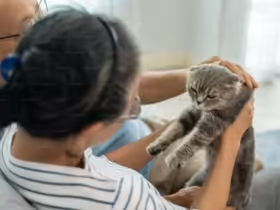Can Cats Get Colds? Here’s How to Help a Cat With the Sniffles
When your cat starts sneezing and has a runny nose, you might wonder, “Can cats get colds?” While cats can’t catch the same viruses that cause colds in humans, they can suffer from respiratory infections and illnesses with similar symptoms. Understanding how to recognize these issues and what steps to take can help you keep your feline friend comfortable and healthy. This guide will explore the signs of a cold in cats, potential causes, and how to care for your cat when they’re under the weather.
Understanding Respiratory Infections in Cats
Can Cats Get Colds?
Cats don’t get colds in the same way humans do, but they can develop respiratory infections that present similar symptoms. These infections are often caused by viruses or bacteria and can lead to upper respiratory symptoms such as sneezing, nasal discharge, and coughing.
Common Respiratory Infections in Cats
- Feline Viral Rhinotracheitis (FVR): Caused by feline herpesvirus, FVR is a common upper respiratory infection in cats. It can cause sneezing, nasal discharge, and conjunctivitis.
- Feline Calicivirus (FCV): Another virus that affects the respiratory tract, FCV can lead to symptoms like sneezing, coughing, nasal discharge, and mouth ulcers.
- Bacterial Infections: Secondary bacterial infections can occur, often as a complication of viral infections. Bacteria such as Bordetella bronchiseptica can contribute to respiratory symptoms.
- Feline Chlamydiosis: Caused by the bacteria Chlamydia felis, this infection primarily affects the eyes but can also cause nasal discharge and respiratory issues.
- Mycoplasma Infections: Mycoplasma bacteria can cause chronic respiratory symptoms in cats, including sneezing and nasal discharge.
Symptoms of Respiratory Infections in Cats
When your cat has a respiratory infection, you might notice the following symptoms:
- Sneezing: Frequent sneezing is a common sign of respiratory irritation or infection.
- Runny Nose: Nasal discharge can be clear, cloudy, or colored, depending on the infection.
- Coughing: Though less common, some cats may cough if the infection affects their throat.
- Watery Eyes: Conjunctivitis can cause watery or swollen eyes.
- Loss of Appetite: Cats may eat less if they are feeling unwell.
- Lethargy: Reduced energy levels are often a sign of illness.
Causes of Respiratory Infections in Cats
Viral Infections
- Feline Herpesvirus: Highly contagious among cats, this virus can cause chronic upper respiratory issues and flare-ups.
- Feline Calicivirus: Often causes outbreaks in multi-cat environments and can lead to severe respiratory symptoms.
Bacterial Infections
- Bordetella bronchiseptica: This bacterium is less common but can cause severe respiratory symptoms, especially in cats with weakened immune systems.
- Chlamydia felis: This bacterium primarily affects the eyes but can contribute to respiratory symptoms.
Environmental Factors
- Stress: Stressful situations, such as moving or introducing a new pet, can weaken a cat’s immune system, making them more susceptible to infections.
- Poor Living Conditions: Poor hygiene, overcrowding, and lack of ventilation can increase the risk of respiratory infections.
- Exposure to Other Sick Cats: Contact with infected cats can spread respiratory diseases, especially in shelters or multi-cat households.
Diagnosis of Respiratory Infections
If your cat shows symptoms of a respiratory infection, it’s essential to visit a veterinarian for a proper diagnosis. Your vet may perform:
- Physical Examination: To assess your cat’s overall health and check for signs of respiratory distress.
- Blood Tests: To identify potential underlying infections or health issues.
- Nasal Swabs or Cultures: To determine the specific virus or bacteria causing the symptoms.
- X-rays: In some cases, imaging may be needed to evaluate the severity of the infection or rule out other conditions.
Treatment Options for Cats with Respiratory Infections
At-Home Care
- Keep Your Cat Warm: Ensure your cat has a warm, comfortable place to rest. Avoid exposing them to drafts or cold temperatures.
- Provide Humidity: Using a humidifier or placing your cat in a steam-filled bathroom can help ease nasal congestion and coughing.
- Encourage Hydration: Make sure your cat has access to fresh water. Offer moist or canned food to help with hydration and nutrition.
- Monitor Symptoms: Keep track of any changes in your cat’s symptoms and consult your vet if they worsen or new symptoms develop.
Veterinary Treatment
- Antiviral Medications: For viral infections like feline herpesvirus, antivirals may be prescribed to reduce the severity and duration of symptoms.
- Antibiotics: If a bacterial infection is suspected or if there is a secondary bacterial infection, your vet may prescribe antibiotics.
- Eye Drops or Ointments: For conjunctivitis or eye irritation, specific eye treatments may be needed.
- Supportive Care: In severe cases, hospitalization and supportive care, including intravenous fluids and nutritional support, may be necessary.
Preventive Measures
- Vaccination: Ensure your cat is up-to-date on vaccinations to help prevent common respiratory infections like feline herpesvirus and calicivirus.
- Good Hygiene: Maintain a clean living environment and practice good hygiene to reduce the risk of infection. Regularly clean bedding, litter boxes, and food dishes.
- Minimize Stress: Provide a stable and stress-free environment for your cat to help support their immune system.
- Avoid Exposure: Keep your cat away from sick animals and limit their exposure to other cats in high-risk environments like shelters or boarding facilities.
When to See a Vet
While mild respiratory symptoms may resolve with home care, you should contact your veterinarian if:
- Symptoms persist for more than a few days or worsen.
- Your cat shows signs of severe illness, such as difficulty breathing, high fever, or a significant decrease in appetite or energy.
- There is a noticeable change in the color or consistency of nasal discharge.
- Your cat has a history of underlying health conditions that may complicate their recovery.
Conclusion
While cats don’t catch colds in the human sense, they are susceptible to respiratory infections that can present with similar symptoms. Recognizing the signs of respiratory issues and understanding how to provide proper care can help your cat recover more comfortably and quickly. If in doubt, always consult your veterinarian to ensure your feline friend receives the appropriate treatment and care. By staying informed and proactive, you can help keep your cat healthy and happy, even when they have the sniffles.











Leave a Reply